
Jury Dimitri Chechi is a retired Italian gymnast.

The men's individual all-around competition was one of eight events for male competitors in the artistic gymnastics discipline contested in the gymnastics at the 2004 Summer Olympics in Athens. The qualification and final rounds took place on August 14 and August 18 at the Olympic Indoor Hall. There were 98 competitors from 31 nations. Each nation could enter a team of 6 gymnasts or up to 2 individual gymnasts. The event was won by Paul Hamm of the United States, the nation's first victory in the men's all-around since the 1904 Games in St. Louis and second overall. It was the first medal of any color for an American in the men's all-around since the 1984 Games in Los Angeles. South Korea took two medals, a silver for Kim Dae-Eun and a bronze for Yang Tae Young. The scoring of the final was disputed; Olympedia calls this "the most controversial men's gymnastic event ever."

The men's horizontal bar competition was one of eight events for male competitors of the artistic gymnastics discipline contested in the gymnastics at the 2004 Summer Olympics in Athens. The qualification and final rounds took place on August 14 and August 23 at the Olympic Indoor Hall. There were 79 competitors from 29 nations, with nations competing in the team event having up to 5 gymnasts and other nations having up to 2 gymnasts. The event was won by Igor Cassina of Italy, the nation's first victory in the horizontal bar and first medal of any color in the event since 1928. Paul Hamm took silver, the United States' first horizontal bar medal since 1992. Bronze went to Isao Yoneda of Japan, the once-dominant nation's first medal in the event since 1984.

The men's parallel bars competition was one of eight events for male competitors of the artistic gymnastics discipline contested in the gymnastics at the 2004 Summer Olympics in Athens. The qualification and final rounds took place on August 14 and August 23 at the Olympic Indoor Hall. There were 81 competitors from 31 nations, with nations competing in the team event having up to 5 gymnasts and other nations having up to 2 gymnasts. The event was won by Valeriy Honcharov of Ukraine, the nation's second victory in the parallel bars. Hiroyuki Tomita took silver, putting Japan above the Soviet Union on the all-time medal table for the event. Li Xiaopeng of China became the seventh man to win multiple parallel bars medals with his bronze adding to his 2000 gold.

The men's pommel horse competition was one of eight events for male competitors of the artistic gymnastics discipline contested in the gymnastics at the 2004 Summer Olympics in Athens. The qualification and final rounds took place on August 14 and August 22 at the Olympic Indoor Hall. There were 80 competitors from 31 nations, with nations competing in the team event having up to 5 gymnasts and other nations having up to 2 gymnasts. The event was won by Teng Haibin of China, the nation's first victory in the pommel horse since 1984 and second overall. Marius Urzică of Romania took silver to become the first man to win three medals on the pommel horse. Takehiro Kashima put Japan back on the pommel horse podium for the first time since 1988 with his bronze.

The men's vault competition was one of eight events for male competitors of the artistic gymnastics discipline contested in the gymnastics at the 2004 Summer Olympics in Athens. The qualification and final rounds took place on August 14 and August 23 at the Olympic Indoor Hall. There were 79 competitors from 30 nations, with nations competing in the team event having up to 5 gymnasts and other nations having up to 2 gymnasts. The event was won by Gervasio Deferr of Spain, the third man to successfully defend an Olympic title in the vault and sixth man to win multiple medals of any color. Latvia and Romania each earned their first men's vault medals, with Evgeni Sapronenko's silver and Marian Drăgulescu's bronze, respectively.

The men's vault competition at the 2008 Summer Olympics was held on August 9 and 18 at the Beijing National Indoor Stadium. The eight competitors with the highest scores in qualifying, among the gymnasts electing to make two vaults, proceeded to the men's vault finals. There, each gymnast performed two vaults; the scores from the final round determined final ranking. There were 16 competitors from 13 nations that made a second vault attempt. The event was won by Leszek Blanik of Poland, the nation's first victory in the men's vault. Blanik was the seventh man to win multiple medals in the event, adding to his 2000 bronze. France earned its first medal in the event with Thomas Bouhail's silver. Anton Golotsutskov of Russia took bronze, putting the nation back on the podium after a one-Games absence.
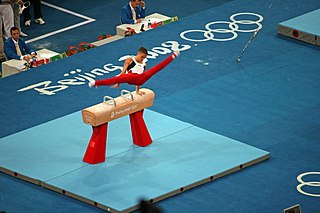
The men's pommel horse competition at the 2008 Summer Olympics was held on August 17 at the Beijing National Indoor Stadium. The eight competitors with the highest scores in qualifying proceeded to the men's pommel horse finals. There, each gymnast performed again; the scores from the final round determined the final ranking. There were 76 competitors from 27 nations that competed on the pommel horse, with nations in the team event entering up to 5 gymnasts while other nations could enter up to 2. The event was won by Xiao Qin of China, the nation's second consecutive and third overall victory in the pommel horse. The other two medals went to nations that had never earned a medal in the event before: Filip Ude of Croatia took silver while Louis Smith of Great Britain finished with bronze.
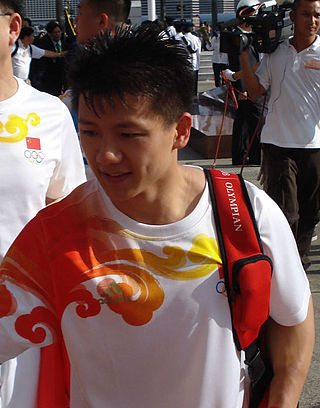
The men's rings competition at the 2008 Summer Olympics was held on August 18 at the Beijing National Indoor Stadium. The eight competitors with the highest scores in qualifying proceeded to the men's rings finals. There, each gymnast performed again; the scores from the final round determined final ranking. There were 70 competitors from 25 nations that competed on the rings, with nations in the team event entering up to 5 gymnasts while other nations could enter up to 2. The event was won by Chen Yibing of China, the nation's first victory in the rings since 1984. Yang Wei, also of China, took silver. Bronze went to Oleksandr Vorobiov, the nation's first medal in the event.

The men's parallel bars competition at the 2008 Summer Olympics was held on August 9 and 19 at the Beijing National Indoor Stadium. The eight competitors with the highest scores in qualifying proceeded to the men's parallel bars finals. There, each gymnast performed again; the scores from the final round determined the final ranking. There were 75 competitors from 27 nations that competed on the parallel bars, with nations in the team event entering up to 5 gymnasts while other nations could enter up to 2. The event was won by Li Xiaopeng of China, the first man to win three medals in the parallel bars as well as the first man to win two non-consecutive gold medals in the same apparatus. Yoo Won-Chul of South Korea took silver. Anton Fokin won Uzbekistan's first parallel bars medal in its debut as an independent nation.

The men's horizontal bar competition at the 2008 Summer Olympics was held on 9 and 19 August at the Beijing National Indoor Stadium. The eight competitors with the highest scores in qualifying proceeded to the men's horizontal bar finals. There, each gymnast performed again; the scores from the final round determined final ranking. There were 76 competitors from 27 nations that competed on the horizontal bar, with nations in the team event entering up to 5 gymnasts while other nations could enter up to 2. The event was won by Zou Kai of China, the nation's first victory in the horizontal bar. Jonathan Horton won silver, the United States' second consecutive Games with a silver medalist in the horizontal bar. Germany's Fabian Hambüchen won the first of his three medals in the event with bronze.

The men's pommel horse competition was one of eight events for male competitors in artistic gymnastics at the 2000 Summer Olympics in Sydney. The qualification and final rounds took place on September 16 and 24 at the Sydney SuperDome. There were 80 competitors from 29 nations; nations competing in the team event could have up to 5 gymnasts in the vault, while other nations could have up to 2 gymnasts. The event was won by Marius Urzică of Romania, the nation's first victory in the men's pommel horse. France earned its first medal in the event, with Eric Poujade's silver. Bronze went to Alexei Nemov of Russia, his second consecutive bronze medal in the event. Urzică and Nemov were the eighth and ninth men to win multiple medals in the pommel horse.

The men's rings competition was one of eight events for male competitors in artistic gymnastics at the 2000 Summer Olympics in Sydney. The qualification and final rounds took place on September 16 and 24 at the Sydney Super Dome. There were 78 competitors from 29 nations; nations competing in the team event could have up to 5 gymnasts in the vault, while other nations could have up to 2 gymnasts. The event was won by Szilveszter Csollány of Hungary, the nation's first victory in the rings. Csollány, who had taken silver in 1996, became the eighth man to win multiple medals in the event. The silver this time went to Dimosthenis Tampakos of Greece—the first medal in the event for a Greek gymnast since 1896. Yordan Yovchev earned Bulgaria's first rings medal since 1960 with his bronze.
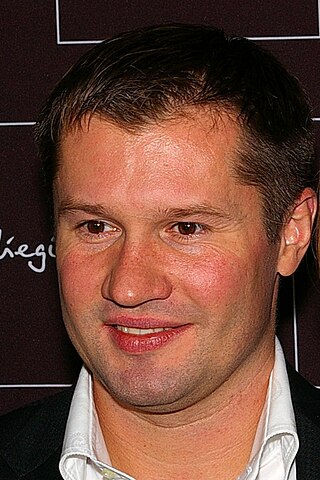
The men's horizontal bar competition was one of eight events for male competitors in artistic gymnastics at the 2000 Summer Olympics in Sydney. The qualification and final rounds took place on September 16 and 25 at the Sydney Super Dome. There were 79 competitors from 28 nations; nations competing in the team event could have up to 5 gymnasts in the vault, while other nations could have up to 2 gymnasts. The event was won by Alexei Nemov of Russia, the nation's first post-Soviet victory in the horizontal bar. Nemov, a bronze medalist in 1996, was the 10th man to win multiple medals in the horizontal bar. Benjamin Varonian earned France's first medal in the event since 1976 with his silver. Lee Joo-Hyung won South Korea's first medal in the event with his bronze.

The men's vault competition was one of eight events for male competitors in artistic gymnastics at the 1996 Summer Olympics in Atlanta. The qualification and final rounds took place on July 20, 22 and 29th at the Georgia Dome. There were 105 competitors from 31 nations, with nations in the team event having up to 7 gymnasts and other nations having up to 3 gymnasts. The event was won by Alexei Nemov of Russia, the nation's first victory in the men's vault after the dissolution of the Soviet Union. Yeo Hong-Chul gave South Korea its third consecutive podium appearance in the event, this time with silver. Vitaly Scherbo of Belarus was the fifth man to win multiple medals in the vault, adding bronze to his 1992 gold.

The men's rings competition was one of eight events for male competitors in artistic gymnastics at the 1996 Summer Olympics in Atlanta. The qualification and final rounds took place on July 20, 22 and 28th at the Georgia Dome. There were 102 competitors from 31 nations, with nations in the team event having up to 7 gymnasts and other nations having up to 3 gymnasts. The event was won by Jury Chechi of Italy, the nation's first victory in the men's rings since 1924 and first medal in the event since 1964. There was a tie for silver, between Szilveszter Csollány of Hungary and Dan Burincă of Romania. It was the best result so far for either nation; Romania had previously had a bronze medalist but this was Hungary's first trip to the podium in the rings.

The men's rings competition was one of eight events for male competitors in artistic gymnastics at the 1988 Summer Olympics in Seoul. The qualification and final rounds took place on September 18, 20, and 24th at the Olympic Gymnastics Hall. There were 89 competitors from 23 nations, with nations competing in the team event having 6 gymnasts and other nations having up to 3 gymnasts. For the second consecutive Games, the event ended in a way tie for first place. Dmitry Bilozerchev of the Soviet Union and Holger Behrendt of East Germany each received a gold medal. It was East Germany's first medal in the rings. The Soviets had had an eight-Games medal streak in the event snapped by their boycott of the 1984 Games; Bilozerchev's medal put the nation back on the podium after that one-Games absence. Sven Tippelt, also of East Germany, took bronze.
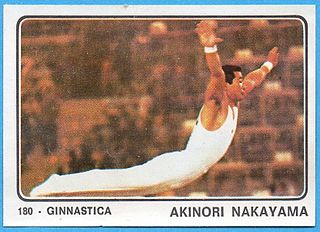
The men's rings competition was one of eight events for male competitors in artistic gymnastics at the 1972 Summer Olympics in Munich. The qualification and final rounds took place on August 27, 29 and September 1 at the Olympiahalle. There were 111 competitors from 26 nations ; nations entering the team event had 6 gymnasts while other nations could have up to 3 gymnasts. The top two places were the same as in 1968, while the next two places were taken by the same gymnasts but in the opposite order. The event was won by Akinori Nakayama of Japan, the nation's third consecutive victory in the men's rings; Nakayama was the second man to successfully defend an Olympic title in the event. Mikhail Voronin's second consecutive silver extended the Soviet Union's podium streak in the rings to six Games. Nakayama and Voronin were the fifth and sixth men to earn multiple medals in the rings. Mitsuo Tsukahara of Japan took bronze, switching places with fourth-place finisher Sawao Kato from the previous Games.
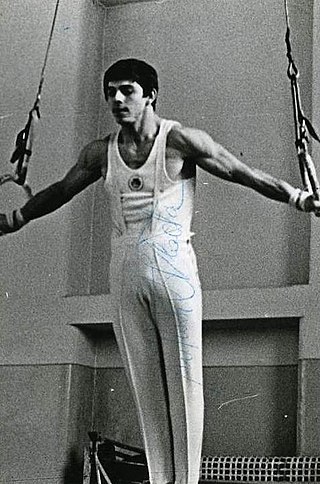
The men's rings competition was one of eight events for male competitors in artistic gymnastics at the 1976 Summer Olympics in Montreal. The qualification and final rounds took place on July 18, 20, and 23rd at the Montreal Forum. There were 90 competitors from 20 nations, with nations competing in the team event having 6 gymnasts while other nations could have up to 3 gymnasts. The event was won by Nikolai Andrianov of the Soviet Union, the nation's first victory in the rings since 1960. Another Soviet gymnast, Alexander Dityatin, took silver. The Soviet podium streak in the event reached seven Games. Dan Grecu earned Romania's first medal in the rings. Japan's three-Games gold medal streak and five-Games podium streak in the event ended as the nation's best results were fifth and sixth places.

The men's rings competition at the 2012 Summer Olympics was held at the North Greenwich Arena on 28 July and 6 August. It included 68 competitors from 31 nations.



















